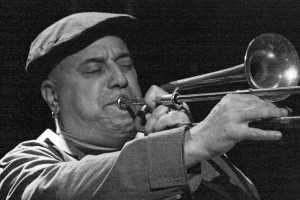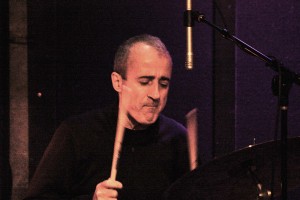by Seth Rogovoy
(HUDSON, N.Y., November 9, 2013) – While they would probably deny any such intentions, the members of Omaha Diner want to do nothing less than to save jazz – to make it matter again, by speaking to contemporary audiences; to awaken people’s interest in a dying, ossified language and style; to gain the attention of an audience that hasn’t listened to jazz since 1960, or 1950; and, perhaps most shockingly, to have fun with the music – to put the jazz back in jazz.
What trumpeter Steven Bernstein, guitarist Charlie Hunter, drummer Bobby Previte and saxophonist Skerik do with Omaha Diner is at once utterly traditional yet totally revolutionary. They turn their musical attention to the rock era – specifically and exclusively to songs that made it to number one on the pop charts, and more generally songs from the R&B side of the rock equation with a leaning toward hits from the last decade or two – in search for raw material for their improvisations. Or as they joked quite a bit in their amazing concert at Club Helsinki Hudson on Thursday night, they demonstrate how so many of the songs that have made it to number one are actually “better than they sound.”
They do this in several different ways, but mostly in one of two ways – by uncovering the musical genius behind unlikely pop confections such as Beyonce’s “Single Ladies” and Eminem’s “Lose Yourself,” or, when even that becomes a stretch, through their own sheer compositional genius, improvisational invention, and athletic virtuosity.
Each of these players is a monster on his own – just look them up on Wikipedia for their full credits. Together, they are truly a supergroup – with Charlie Hunter holding down simultaneous guitar and bass chores on his seven-string instrument (or was it eight?), with Bernstein and Skerik a two-man horn section that rivals (as well as bringing to mind) Ornette Coleman and Don Cherry, and Previte – oh, Bobby Previte, how we could listen to and watch you play all night long, anything – as precise and eloquent a drummer/percussionist as any, with the bebop chops of a Kenny Clarke or Roy Haynes or Art Blakey and the power of rockers such as Steve Gadd and Kenny Aronoff and the fluency and soulful musicality of Levon Helm and Ringo Starr.
Together, they are a veritable wrecking crew – deconstructing and reconstructing these pop hits, exploring the far corners of melody and harmonic changes, messing around with rhythms and bridges and tonalities, stretching the tunes to within inches of their lives, and bringing them back home again, and leaving listeners gasping for breath in the process (and often scratching their heads wondering what tune they just heard).
What Omaha Diner does is really no different from what small jazz ensembles have been doing for 60 or 70 years – taking the hits of the day and playing them in their own style and using them as raw material for improvisation. Whether it was Benny Goodman playing “Honeysuckle Rose,” or Glenn Miller playing “Tuxedo Junction,” or Pee Wee Russell playing “Over the Rainbow,” or John Coltrane playing “My Favorite Things,” jazz musicians have always had one eye – or ear – on the pop charts. Indeed, in large part this is why jazz, in mid-century America, was nearly synonymous with popular music.
Nowadays, jazz has been marginalized, and no longer speaks of or to America except in the most rarefied circles. The blame for the death of jazz, however, lies squarely with those who like to think of themselves as standard bearers for the art: preservationists, documentarians, jazz academics, festival programmers, and anyone who calls jazz “America’s classical music,” as if it needs the imprimatur of “classical” to be considered somehow legitimate or worthy of attention.
Far too much energy – and nonprofit funding – is spent trying to force-feed jazz renditions of the so-called Great American Songbook – those same three-dozen tired, ossified show tunes and “pop standards” – like so much musical goose liver down the throats of unsuspecting, would-be jazz lovers – namely, high school youth and young adult audiences. But rather than being good for you, as these champions of jazz-as-high-culture always insist the likes of Cole Porter, Jerome Kern, the Gershwins and Rodgers and Hammerstein are, they merely alienate listeners who feel the sneering condescension with which these tunes are delivered in their museum-like renditions that strip away any relevant passion or emotion that speaks to the here-and-now. Like that pate, they leave a listener with clogged musical arteries and a feeling of having stuffed oneself full of something tarnished, illicit, even borne of some kind of cultural cruelty.
In other words, jazz is not a canon – jazz is a method, an approach that can be applied (with varying degrees of success, mostly determined by wit, talent and invention of those playing it) to any music. While listeners in the 1940s and 1950s were obviously moved by jazz renditions of the hits of the day, that doesn’t mean we need be stuck listening to them for all eternity. God help us all.
And Omaha Diner showed why that’s the case, with their dynamic renditions of tunes such as Guns ‘n Roses’ “Sweet Child o’ Mine,” Terence Trent D’Arby’s “Wishing Well,” and Adele’s “Rolling in the Deep,” played in varying degrees of loyalty and fidelity to the originals, ranging from relatively close to the vest to fiercely deconstructed free jazz. With these players, however, it was all brilliant, as you couldn’t ask for a greater combination of technical talent and idiosyncrasy than that which exists in this band.
As much as he is a lion of the downtown avant-garde, Steven Bernstein, remember, was the musical director for Robert Altman’s much-lauded “Kansas City,” which was in part a love letter to that city’s legendary jazz scene of the 1930s, which boasted Coleman Hawkins, Lester Young and Ben Webster. For every outsider project he’s worked on with John Zorn, Roswell Rudd, Sam Rivers and Don Byron, there has been one with a mainstream artist such as Linda Ronstadt, Sting, Elton John and Aretha Franklin. In that sense, Bernstein is the virtual embodiment of nearly a century’s worth of American pop and jazz history.
Yet you rarely find Bernstein on the bill at mainstream jazz festivals in this country. You do, however, find him at the top of the bill at European festivals. That, of course, has long been the legacy and struggle of American artistic geniuses – overlooked at home, championed abroad. Instead, we are fed with the staid works of neo-traditionalists, or subject repeatedly to aging musicians who haven’t done anything new in 40 years – or even if they have, are basically hired to repeat themselves over and over again like minstrels or clowns, out of some misguided sense of nostalgia masked as preservationism.
And the struggle goes on to interest younger people in jazz, and programmers tie themselves in knots trying to figure out how to grab the attention of the digital generation, while the answer is so obvious – it’s there right in front of them. Program jazz, for heaven’s sake – the same music you fell in love with the first time, except not the same.
Program the jazz of today, or the music’s epitaph will be written tomorrow.



1 comment for “(Concert Review) Omaha Diner Sets Out to Save Jazz by Destroying It”